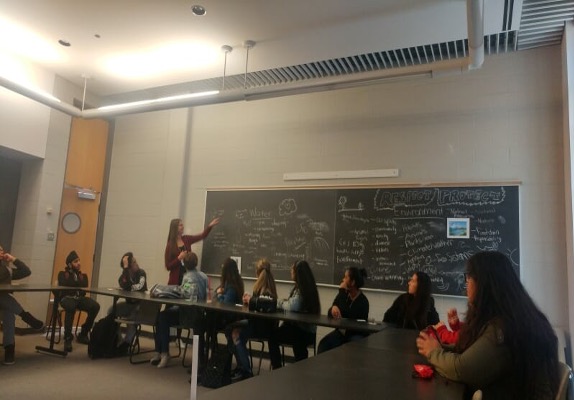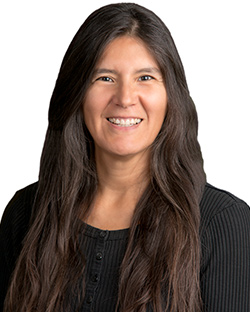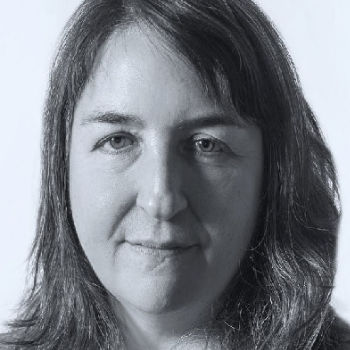The Indigenous Environmental Justice team consists of numerous researchers and collaborators who since 2016 have contributed to a wide variety of IEJ projects. Our researchers include York University faculty, students, postdoctoral fellows, and community members. Our collaborators have also played a vital role in generating and sharing knowledge on Environmental Justice.
For more information on the work of our researchers, see Projects and Publications.


Dr. Deborah McGregor (Anishinaabe), Principal Investigator, holds the Canadian Research Chair in Indigenous Environmental Justice at York University. She is cross-appointed to Osgoode Hall Law School and the Faculty of Environmental Studies (FES). She is also the Director of the Centre for Indigenous Knowledges and Languages. Dr. McGregor's research has focused on Indigenous knowledge systems and their various applications in diverse contexts including water and environmental governance, environmental justice, forest policy, and management, and sustainable development. Her research has been published in a variety of national and international journals and she has delivered numerous public and academic presentations relating to Indigenous knowledge systems, governance, and sustainability.
Dr. McGregor remains actively involved in a variety of Indigenous communities, serving as an advisor and continuing to engage in community-based research and initiatives. In 2021, she was the co-recipient (along with Dr. Angele Alook) of York University's Catalyzing Interdisciplinary Research Clusters (CIRC) Grant for "Indigenous Climate Leadership and Self-Determined Futures."

Dr. (Kristi) Leora Gansworth, Anishinabekwe, is a scholar and maker who holds a PhD from York University in the field of critical geography. She is also trained in the social sciences of environmental and food systems (MA, Antioch University, 2014) and is a lifelong poet/artist (MFA, Writing, Goddard, 2012). Leora is a proud citizen of Kitigan Zibi Anishinabeg, where her maternal ancestry comes from. She also grew up living with Haudenosaunee Peoples (paternal ancestry) on Tuscarora Nation territory.
Sovereignty and healing are the foundation of research practice for Dr. Gansworth. Mino bimaadiziwin, the gift of life, was given to Anishnabeg to care for and Leora applies this responsibility in her works. She is a frequent contributor and collaborator on projects that relate to multiple forms of justice.

Dr. Alan Corbiere is a proud Anishinaabe from M’Chigeeng First Nation on Manitoulin Island. He is a historian who has made remarkable contributions to the research of the Anishinaabe language, practices and material culture for many years. Dr. Corbiere completed a B.Sc. from the University of Toronto, and a Masters in Environmental Studies and a Ph.D. in History from York University.
Previously, Dr. Corbiere was the Anishinaabemowin Revitalization Program Coordinator at Lakeview School, M’Chigeeng First Nation, where he and his team worked on a culturally based second language program that focused on using Anishinaabe stories to teach language. He has also conducted research on wampum belts with known Anishinaabe associations, and researched medals, gorgets, and other diplomatic gifts. He has recorded elders speaking in Ojibwe about their crafts and work. Additionally, Dr. Corbiere is the Executive Director of the Ojibwe Cultural Foundation and is one of the co-founders of GRASAC.

Dr. Lisa Myers is part of the Indigenous Environmental Justice project's core research team. Dr. Lisa Myers is an independent curator and artist with an interest in interdisciplinary collaboration. She has a Master of Fine Arts in Criticism and Curatorial practice from OCAD University. Dr. Myers’ recent work involves printmaking, stop-motion animation, and performance. Since 2010, she has worked with anthocyanin pigment from blueberries in printmaking and stop-motion animation. Her participatory performances involve sharing berries and other food items in social gatherings reflecting on the value found in place and displacement, straining and absorbing. Myers has exhibited her work in solo and group exhibitions in venues including Urban Shaman (Winnipeg), the Art Gallery of Peterborough and the Art Gallery of Ontario. Her writings have been published in a number of exhibition publications in addition to the journals Senses and Society, C Magazine and FUSE Magazine.
One of Dr. Myer’s research projects is titled “Finding Flowers”. As stated by Dr. Myers, this project focuses on pollinator conservation through ecology, art and pedagogy and aims to take a biocultural and interdisciplinary approach to investigating plant-pollinator biodiversity in Canada, while also expanding Indigenous art history and curatorial practices. Some of Dr. Myer’s curatorial research interests include museum conventions, contemporary indigenous art, geography and 'ideas of value'. In her curatorial practice, Myers works with artists collaboratively to investigate the curatorial premise or thesis of an exhibition. Through this, Myers can value the reciprocation of ideas and research between the artists and the curator throughout the planning of an exhibition.
Dr. Myers is a member of Beausoleil First Nation and lives in Port Severn and Toronto, Ontario.

Dr. Nicole Latulippe is a critical geographer and environmental studies scholar at the University of Toronto. She works on questions of right relationship with the land, waters, and peoples of place. Nicole has collaborated with Dr. McGregor and the Indigenous Environmental Justice project; allied with Nipissing First Nation on community-fish relations and related knowledge, governance and law; and partnered with the Mississaugas of the Credit First Nation and Ngā Aho Māori Designers Network to connect Indigenous placemaking practitioners on Menecing, the Toronto Islands. Current projects explore just land and water stewardship in Toronto and pathways to transformative guest-host and treaty relationality. Nicole grew up on Anishinaabeg territory in family of mostly French descent. Before entering academia, she spent several formative years working for the Anishinabek Nation (Union of Ontario Indians) on the Ipperwash implementation process. Her research practice is informed by Indigenous and critical qualitative Western paradigms. It is grounded in community-engaged approaches and deeply influenced by many teachers, mentors, and colleagues.
Our researchers include faculty, postdocs, students, and other researchers working on IEJ projects that further the understanding of Indigenous Peoples and Environmental Justice.
Sarah Afriyie
Rachel Arsenault
Casey Bas
David Bazargan
Dali Carmichael
Tara Chandran
Jayce Chiblow
Pippa Feinstein
Leora Gansworth
Angelika Kuzma
Aamina Masood
Ethan Persaud-Quiroz
Samantha Pugliese
Mahisha Sritharan
Noah Verhoeff
Jesse Abell
Nevada Anwhatin
Melanie Bartosh
Brandon Bear-Jeanes
Max Corne-Klein
William Dandie
Meagan Dellavilla
Andrea De Shield
Meghan Fowler
Nasreen Hussain
Emilia Khalil
Lauren King
Max Klein
Adrianne Lickers
Mika Mackinnon
Peter Mangaly
Laura McClean
Lance Morrison
Nasra Moumin
Jackie Peat
Salisha Purushuttam
Abdeali Hatim Saherwala
Monica Shafik
Kim Tran
